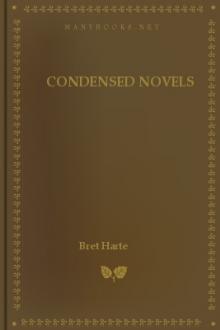Condensed Novels by Bret Harte (best books under 200 pages .txt) 📕

- Author: Bret Harte
- Performer: -
Book online «Condensed Novels by Bret Harte (best books under 200 pages .txt) 📕». Author Bret Harte
BY MR. BENJAMINS.
CHAPTER I.
"I remember him a little boy," said the Duchess. "His mother was a dear friend of mine; you know she was one of my bridesmaids."
"And you have never seen him since, mamma?" asked the oldest married daughter, who did not look a day older than her mother.
"Never; he was an orphan shortly after. I have often reproached myself, but it is so difficult to see boys."
This simple yet first-class conversation existed in the morning- room of Plusham, where the mistress of the palatial mansion sat involved in the sacred privacy of a circle of her married daughters. One dexterously applied golden knitting-needles to the fabrication of a purse of floss silk of the rarest texture, which none who knew the almost fabulous wealth of the Duke would believe was ever destined to hold in its silken meshes a less sum than L1,000,000; another adorned a slipper exclusively with





Comments (0)